Southport Village Voices
An E-Magazine by & for the Residents of Southport
Number 76, June 2016
|
| | |
"Home Sweet Home," quilt by Elizabeth Donovan
|
|
|
|
|
|
|
|
The Best Night of the Year...
|
...at Mashpee High School is arguably Awards Night, when scholarships are presented to seniors who plan to attend college.
This year, on May 19, the MHS auditorium was filled with proud, enthusiastic families, along with representatives from the individuals and organizations that award the scholarships, among them Allyn Brockman, representing the Southport Residents Scholarship Committee. Approximately 50 seniors proceeded down the center aisle of the auditorium and took their seats on the stage, where they waited to see what their applications for support might yield.
Despite the presence of wealthy summer communities in Mashpee, overall this is not a wealthy town. Without help from the community, many families will have a tough time financing a college education for their son or daughter.
But if Awards Night is any indication, this is a close-knit and supportive community. Once the program was underway, it took nearly two hours for about 40 donors to present their awards, ranging from very generous four-year scholarships to a nice laptop computer.
It was heartwarming to see the smiles of all the seniors as they received their awards. And it was especially satisfying to know that our Scholarship Committee, founded 13 years ago by Ed Larkin and the late Julie McDevitt, continues the tradition of raising money for this very worthwhile cause. We owe them our thanks for the work that they do.
As the evening drew to a close, I began to think about how big Southport has become over 13 years and to wonder if it isn't time to up the ante. With nearly 700 homes here -- and 50 more to come -- there are now well in excess of 1000 residents. If we each contributed just $10, we could award more scholarships or increase the amount of each award; a $1000 scholarship is significant but doesn't go as far as it used to.
One painless way to contribute throughout the year is to make periodic "tribute" donations to the Scholarship Fund. These can memorialize a departed friend or family member, or acknowledge a special occasion -- a special birthday or the birth of a grandchild or a graduation. If you look for such opportunities, you'll find lots of them -- and you'll be strengthening our ability to aid more MHS seniors.
There are a lot more of us these days; let's increase our support for the community, helping as many college bound kids as possible.
We can afford it.
-------------------------------------------

SHARE A MEMORY ABOUT YOUR HIGH SCHOOL DAYS!
I'm soliciting short stories about your high school experience to be published in the July issue of
Southport Village Voices. If you had a special teacher, a first boy or girlfriend, a funny event, etc. and would like to share it, please send it to me. About 300 words is good. Deadline is June 24. Pictures are always welcome. Thanks.
|
|
 |
|
|
|
SOUTHPORT PROFILE
Frank & Diane Boloz
an interview with David Kapp
|
|
|  | |
Frank & Diane Boloz
|  |
In 1939, Frank Boloz's mother and father were members of the Polish Army when Poland was overrun by Germany and Russia at the outset of World War II, they were captured and sent east to Siberia. In 1942, Russia was persuaded by the Allies to release the Polish prisoners, and his parents joined the Polish Army in exile, attached to the British forces. In 1947 the British Army was in Palestine, where relationships between Arab Nationalists and Jewish Zionists had taken a murderous turn -- and both groups wanted to see the last of the British occupying forces. Frank picked this tumultuous time and place to be born in a military hospital in Tel Aviv.
The British left Palestine in 1948 and the Boloz family found a new home in England. Two years later, they emigrated to Hartford, CT, and then moved next door to Newington, where Frank's father practiced his trade as a carpenter and his mother was a homemaker and worked for Hartford Hospital for over 25 years. Diane Perry's family lived in Newington as well. She and Frank attended the same middle school and met in 8th grade.
The center of religious life for Polish-American Catholics in the Hartford area, Saints Cyril and Methodius Parish, was founded in 1902 specifically to minister to immigrants like the Boloz family. Frank found a role there as an altar boy and became familiar with the sacraments of the Church -- from christening to last rites. In the Polish community, where funeral services are an important part of their faith, altar servers assist the priests, beginning at the funeral home and ending at the cemetery. This activity attracted Frank's interest; he enjoyed serving people. So after high school graduation, he enrolled at the American Academy McAllister Institute of Funeral Service in New York to study mortuary science, then followed that with an apprenticeship at a funeral home in Hartford.
 |
|  |
Saints Cyril & Methodius Catholic Church
is the center of Polish-American religious life
in Greater Hartford. Frank's experience as an altar server there helped to direct
the course of his life.
|
"My father thought I was crazy," he says, but his girlfriend Diane expressed no concerns. And life in the funeral business wasn't as staid and reserved as one might think. On the night that Frank and Diane got engaged, they cruised their hometown in a hearse, greeting everyone they knew along the way. "It was a Cadillac," Frank notes.
Frank discovered that he had a natural talent for the job. He enjoyed comforting people and helping them to cope with funeral arrangements at a difficult time in their lives. "And he was exceptional at the job," Diane says, "He smiled, he could help people relax." There were practical benefits as well. The job was rewarding, he received accolades for his work and built lasting friendships; and, the profession ranks real high on the job security scale.
So what did he learn about mortality in a job where he dealt with the families of the deceased every day? "Sometimes death comes as a release, a blessing, especially if a person has been ill for a long time." Sudden death is often traumatic if it's unexpected and people have had no time to prepare for it. On the other hand, sudden death at the end of a long and happy life might be viewed as "the best way to go." "The most difficult funerals are those involving children," he says, "We never charged for those services."
|
|  | |
Diane and Frank met in 8th grade and married in 1969. Here they are at their high school prom.
|  |
After high school, Diane attended the Chandler School for Women in Boston, studying business. She and Frank married in 1969 and set up housekeeping in Newington while he continued to work for 10 years in the funeral business.Their son David was born in 1970 and their daughter Wendy followed in 1972. Diane worked for various corporations in the Greater Hartford area and, eventually, for 29 years at Newington High School for the Director of Special Education.
In 1979, Frank decided he needed to increase his income and left the funeral business to become an electronics salesman. He worked his way up to sales manager but found that managing other people was a headache. He much preferred being a sales rep, a job that paid well, at which he excelled and that he enjoyed. In 2001, he left that job and reverted to the mortuary business, securing a position with the Duksa Family Funeral Homes in Newington and New Britain where his Polish language skills were an asset. "Our Polish-American clientele seldom conducted business over the phone," he says. "They walked to the funeral home and dealt with matters face to face. It was important for me to be there and to be able to speak their language."
Over the years, Frank and Diane came to Cape Cod regularly for vacations, and before moving to Southport they had owned a condo at Deer Crossing in Mashpee. They were familiar with Southport and watched its development each time they came to the Cape, finally deciding to leave Newington after 50 plus years and buy a home here after they retired in 2014. As they prepared to move, however, Frank began to exhibit disturbing health problems.
Tests revealed that Frank had an enlarged spleen, but more worrisome than that, he was diagnosed with non-Hodgkin's large cell lymphoma - a cancer of the blood. Fortunately, treatment is available and he has confidence in his medical team. He will need treatments every three months for the next two years. His illness did not stop them from moving to Southport where, in fact, his new neighbors have been supportive in every way possible.
When I asked him how his working experiences and his illness have affected his view of his own mortality, Frank said, "I hope for a long life, but death is just another step. I've been dealt a good hand and I played it right." And, he mentioned several times that a big part of that good hand is his wife Diane. Another important part of that "good hand" is his daughter Wendy, who lives in South Grafton with seven-year old Samantha. And his son David and his wife Nicole, whose "miracle" twin preemie babies, Carsten and Mia, weighed in at 1.12 and 1.9 pounds respectively. They were the Massachusetts March of Dime babies in 2005 and are now healthy 13-year olds.
|
| |
The Boloz Family: Back Row (l to r) Diane, Wendy, Carsten & Mia, David & Nicole.
Front: Samantha and Frank
|
Frank's approachable, friendly personality is immediately apparent when you meet him. And it's pretty obvious why he has been successful in both the funeral and the sales business. Roy Reiss, who coordinates Southport's Neighborhood Rep program spotted it early on and recruited Frank as a rep for "Lower Grey Hawk (#s 9-64)." The job is a natural for Frank, who has made it a point to write a letter of welcome to each new homeowner in his neighborhood. He's also compiled a list of the residents in Lower Gray Hawk and shared it with everyone in neighborhood so that everyone knows who lives there. Frank makes it a point to get to know his neighbors, to assist in finding solutions to their concerns and generally to expedite communication and foster social interaction.
Frank and Diane have quickly become an integral part of the Southport spirit that enriches our community, making it a great place to live.
|
An Old School Dad
by Andy Jablon
|
|
|  | |
Milt & Norma Jablon
|  |
My dad Milton was an old school dad. Born in Brooklyn, he moved the family to Harrisburg, Pennsylvania when I was about nine. There, he ran a small shoe factory, work that was similar to what he had done in New York after marrying my mom and learning the shoe business from my grandfather. Harrisburg in the 1950s was a big change from New York. It was like stepping back in time about 20 years.
He and my mom had three kids. I'm not sure why; he wasn't much involved with us while we were growing up. He worked a lot. I'm told by his siblings that he was a good athlete and a very good baseball player, but he didn't play ball with us. I remember my first varsity basketball game; he told me he had heard from one of his friends that I played well. But he never came to a game. When he took up tennis in his fifties, we played together for the first time. After hitting for a few minutes, he told me, "Hey, you're pretty good."
I guess I just accepted who he was. He was pretty stressed coming home from work every day. Dinner was at 5:30 every night, about five minutes after he got home. After that he usually retired to the bedroom to watch TV. His only passion outside of work was golf. If I needed to ask him something during golf season, I would reach him by calling the golf course and paging him. On weekends during the season, he usually was out of the house before we got up and didn't return until about 5:00. I'm not sure what he did with his free time after golf season.
My dad retired at 59. It was a forced retirement. His business closed when the shoe business in the US went kaput. Afterwards, he finally seemed to relax and enjoy life more until he died from lung cancer at the age of 68. I suspect all those years of cigar smoking caught up with him.
Since moving to Southport, I realize this would have been the perfect place for him after retirement. Too bad such communities didn't exist then. My dad loved hanging out with his friends. He was a different person around his friends than with us as kids. He was funny, he loved joking around, people liked him, and with his love of golf, Southport would have been a perfect fit.
Now when I'm roaming around Southport, I think about him. I see him on the golf course, I see him in the Card Room, I see him at Men's Coffee, I see him in the Village Center by the fireplace, telling jokes, sharing stories, laughing with the guys and very content being here. Happy Fathers Day Dad. See you around at Southport.
|
The Immigrant
by Lydia Biersteker
|
|
|
What was it like to bid
your husband farewell?
He promised to send
for you and your two
children in a year's time,
and he did, but what was
it like to have your four
year-old son denied
passage on the day of
your departure because
of an eye infection?
What was it like to make
the voyage with just your
second born son?
What was it like to turn
to the same village folk
that came to see you off
and entrust your eldest
boy to their care?
Someone brought him
to America in 1909, two
years after the last time
you held his hand or saw
his face.
What was it like to see
him again, to hold him in
your arms, to introduce
him to his new born baby
sister?
He spent his whole life,
up to his death, trying to
regain his status as the
first born son.
He never fit back in.
I've got so much I wish
I could ask you, Grandma.
What was it like leaving
your land, your siblings,
your friends and know
that it was forever?
Grandma, I used to hear
you cry at night, was it
all worth it?
Cause, Grandma, I
could have liked
growing up in Sicily
the way you did.
|
|
|
Visiting Dad at Work
by Jack Donovan
|
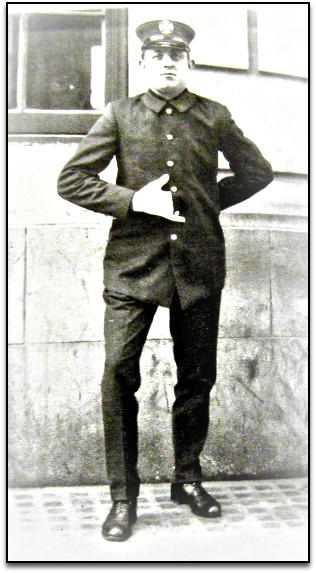 Visiting Dad at work, as a pre-schooler, was very significant for me. I even remember what I wore that day: blue short pants, a white sweater and a blue hat with a little peak, not a baseball hat. It was a beautiful day, either spring or fall, when Mom walked me the length of Brooklyn's Prospect Park to the Crown Heights section. At some point we turned the corner at St. John's Place, and I saw it. The fire house was there. Dad was a member of Hook & Ladder 132, the Fire Department of New York -- the FDNY -- The Bravest. Visiting Dad at work, as a pre-schooler, was very significant for me. I even remember what I wore that day: blue short pants, a white sweater and a blue hat with a little peak, not a baseball hat. It was a beautiful day, either spring or fall, when Mom walked me the length of Brooklyn's Prospect Park to the Crown Heights section. At some point we turned the corner at St. John's Place, and I saw it. The fire house was there. Dad was a member of Hook & Ladder 132, the Fire Department of New York -- the FDNY -- The Bravest.
Dad pointed out his name (and mine) on the ride board, the chalk board on which that shift's crew had their names and assignments written. Dad showed me his turn-out gear - helmet, coat and boots -- hanging near the tiller, his position on the apparatus.
In the kitchen, I remember seeing the biggest percolator coffee pot I had ever seen, much bigger than ours at home. I remember the feel of the crew's rough hands as they shook my small hand, and their ready smiles.
Dad took me upstairs to the bunk room. The off-duty men had draped their suspendered pants over their boots by the side of their cots, facing the pole hole. Bells sound -- lights glare -- feet into boots -- suspenders up -- go for the pole, as the man on house watch yells the command: "Get out 132! We're first due!"
Wow! I wanted boots and suspenders. I had a lot of pants. Wow! I settled for sliding down the pole tucked under Dad's arm and petting the Dalmatian, the fire dog, at the bottom.
What a day for a little boy to have. What a day for an older man to remember.
A footnote. On the morning of 9/11/01, the men of H & L 132 responded to an alarm from which they did not return. Their children were far less fortunate than I.
|
Ain't Love Grand!
by Sandy Bernstein
|
 |
|  |
Minnie & Fred on the roof of the sanitarium in 1933
|
This is not my personal memory of my parents, rather a story of the love that blossomed between them twenty-five years before I was born. In the early 1930s, my mother was a young tuberculosis patient at the Middlesex County Sanatorium in Waltham, Massachusetts. She was trained as a nurse at the sanatorium and contracted the disease while working there. She was engaged to my father at the time.
I never forgot her stories. When I was sorting through her things after she died in 1994, I came across several diaries. I was reminded of her early life and suddenly wanted to know more. But she was gone and her diaries were nothing more than dry accounts of sputum tests, doctors' rounds, and the strict regimen that sanatorium patients had to endure from the moment they got up until the lights were turned out right after dinner.
I wanted the personal story, the one I could only vaguely recall of their courtship and how love grew during their secret nightly rendezvous. But with my father gone as well, there weren't many people left who'd know the whole story. So I sought the help of my mother's long-time friend and former TB patient, Frances. We became good friends. She told me facts about the disease as well as the personal stories I was after.
My favorite was how my mother had snuck out at night to meet my father. They would go out for late suppers and necking sessions. She'd be gone for hours, according to Frances, who was sworn to secrecy. She couldn't believe Minnie had gotten away with it. As a nurse, my mother knew the hospital's routines, and she often slipped by the front desk without being seen. "She could have gotten into serious trouble," Frances said. "But oh, ain't love grand."
|
The Man Who Could Do Everything
by Ray Schumack
|
Years after his death, the father I remember is always the man he was in his mid to late 30s -- a dedicated family man, energetic, hardworking, honest and trustworthy. Now, in my old age, that's a very good and happy image to hold.
In my early years, however, there were times when I felt he was so busy working he did not have time to talk to me. Times I felt inferior because he was so good at everything. Times I thought he was mean because he made me pay board to live in his house as soon as I was earning pocket money.
He grew up in the Bronx as an only child who played the violin by age 10. He finished grammar school at 13 and immediately went to work to help support his family. Following a family tradition, he became a carpenter. He was 19 and a member of a Saturday night jazz band when he met my 17-year-old mother; they married on her 18th birthday. My sister Estelle was born four years before me, and that's when I began to learn about the man I first called Da-Da, later Daddy and eventually Dad.
He always had a job, even during the years of the Great Depression. He always came home from work, always sat at our kitchen table paying his bills every two weeks, always spent weekends and summer vacations building a country summer house for us, always attended monthly meetings of the Carpenters Union and American Federation of Labor meetings to help support his fellow carpenters.
Dad was a striver, continually looking to advance his employment opportunities to improve our lives. At first, he worked for contractors during the housing boom of the 1920s but then, wanting something more secure, he took a civil service test for a job as a carpenter with the City of New York. He got the job. It was the year before the start of the Great Depression. Most of the people with secure jobs, paying a livable wage (about $35 a week), worked for the government - policemen, firemen, mailmen and others.
One day, I saw Daddy at work when my mother took me for a ride on a trolley car that passed over one of the small river bridges in the Bronx. He was with other men, all of them wearing carpenters overalls, on a job. But when he dressed up to go out, he wore a fashionable derby and an elegant form-fitting Chesterfield overcoat with a velvet collar. I once asked him if I could have that coat when he died. He assured me he would not die for a long time. And he didn't.
Another early memory is of my mother taking me for a walk one Saturday morning so Daddy could study for upcoming exams at the technical school where he was enrolled at night. My next memory is walking down the street, holding his hand, listening to him tell me me that he got the top score in a civil service test for foreman carpenter. His new job was to manage a carpenter shop responsible for maintenance work on the Brooklyn and Manhattan Bridges. His crew also set up the grandstands every time the mayor dedicated a project. During those years Dad always wore a business suit to work.
From his nighttime classes, Dad not only acquired the knowledge to pass that foreman's civil service test, he also was awarded a New York State teachers license. He was too old to serve in the armed forces during World War II but, while still working days as a foreman carpenter, he taught night classes in a national war effort program for engineering students, despite the fact that he had no engineering degree.
Later, when a city engineer retired, the commissioner of Dad's department promoted Dad to that job, where he supervised 100 professional trade workers responsible for repairing and maintaining City Hall, the Municipal Building skyscraper and all of the city's courts.
In his 60s, Dad retired early so he could work as an officer in the New York Carpenters Union headquarters. As the only member with a teachers license, he was assigned to the planning and construction of a carpenter's apprentice training school and then served as the school's principal until he retired again, at the age of 68. He then moved to Pompano Beach, Florida and lived happily there until he died at 82.
In my own working years, I came to realize my father taught me how to be a good citizen and a responsible worker, dedicated to my children, spending as much time as possible with them and doing things together. I also realized that my father taught me to be much like him and eventually found that I could accomplish almost anything I set my mind to do.
Today, my memories of Dad are of a man who took me on a car trip to Canada as a high school graduation present and camping in the Adirondacks. He also spent a three-week summer vacation building a 16-foot kayak for me to paddle around Lake Peekskill. My best memory of Dad, however, goes back to 1938, when he sold his favorite used car for $60 in order to buy me a set of Lionel trains as a Christmas present.
|
New in the Neighborhood
Spotlight Interviews & Pictures by Andy Jablon
|
Lenny and Kathleen Ciavarro 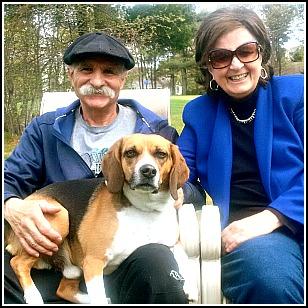
6 Putting Green Path,
Moved in April 2016
- Originally from: Lenny: Somerville; Kathleen: Dorchester
How They Met: Met at Boston State College (now UMass Boston)
Previous Residence: Quincy
What Kind of Work Did You Do:
Lenny: Special needs high school teacher in Quincy; Kathleen: Human resource manager for Commonwealth of MA
Why Southport: Lenny's mother Anna Ciavarro lived here 2000-2014 and was one of the pioneers. His sister Angela and brother-in-law Robert DeMichele had also lived here.
Like Best about Southport: Being on the Cape, all the activities here.
You may see Lenny and his beagle on their daily walk around the perimeter of Southport.
Like Least: No recycling and would love to have an onsite restaurant.
Want to Get Involved with: Lenny: Cribbage, bocce, shuffleboard, bridge; Kathleen: Book club, shuffleboard, bocce
________________________
NOTE: If you are a newcomer to Southport within the last year
and would enjoy meeting Andy for a Spotlight interview,
please contact him at andy@wvpboston.com.
|
|
NON COMPOS MENDES
Bob Mendes
|
- We at Southport are sometimes pretty smug, thinking that we have a powerful voting influence on the town of Mashpee. Sure, when an issue arises that affects us we can control the vote, right? Not so much. When Southporter Rob Hansen ran for the Planning Board in May, he got a little more than 200 votes, too few to win him the office. So -- powerful voting bloc? Wake up Southport; If you don't vote you got no power!
- Someone asked me why I never write about the miseries of driving on Leisure Green anymore. Because it's like complaining about tectonic movement.
- Grandparents Take Notice I've spent a lot of time lately with my 2-1/2 year old granddaughter and frankly, she's a riot. On her last sleepover, she awoke at two a.m. and advised me that there was a chicken in her bed. She says so many funny things that it gave me an idea. I'm sure your grandchildren are as funny as mine, so if you send me a goodie, I'll put it in a special section of this column -- and maybe someday, if there are enough, include them in a book (with proper attribution). Send your goodies to bob246oncape@gmail.com with "Hilarious Grandchildren" in the subject line.
- It's curious how certain adjectives seem to gravitate toward specific nouns.For instance, the "unvarnished truth." Has anyone ever told the varnished truth? Or, how about a "devout Catholic"; aren't there any devout Episcopalians or Unitarians? Same goes for "staunch Republicans." Surely, somewhere there are some dithering Republicans or wobbling Republicans. Finally -- "stately mansions." There's a term that probably goes back to Jane Eyre, but mansions remain stately.
-
Is the Village Center lobby starting to look like an inner city bus terminal --
or is it just me being overly fussy? There are so many papers and cards and other forms of clutter lying around, it seems no horizontal surface is safe.
- Words to live your life by -- from Tip O'Neill:
- It's nice to be important, but it's more important to be nice.
- Take your job seriously, but don't take yourself seriously.
- It's OK to disagree, just don't be disagreeable.
- More from Anything for a Vote: When George Washington announced he would leave office in 1796, a scramble began among our founding fathers, John Adams and Thomas Jefferson in particular, to see who would replace the irreplaceable George.
Ol' Tom, GW's former secretary of state, took a shot at his old boss, saying, "The president is fortunate to be getting off just as the bubble is about to burst, leaving others to hold the bag." Even Jefferson, one of the most intelligent men ever to walk the streets of the nation's capital, was vulnerable to a mixed metaphor. Other niceties brought up during the election were the size of Adams's belly and Jefferson's penchant for atheism and the French Revolution.
All this considered, I still think our upcoming election will be one of the most repulsive, sordid and tasteless in the country's history.
- And still more politics, thanks to Bob LaRocca for forwarding these quotes.
- Clarence Darrow: "When I was a boy I was told that anyone could become president. I'm beginning to believe it."
- Adlai Stevenson: "I offer my opponents a bargain. If they will stop telling lies about me, I will stop telling the truth about them."
- Nikita Khrushchev: "Politicians are the same all over. They promise to build a bridge where there is no river."
- Doug Larson: "Instead of giving a politician the keys to the city, it might be better to change the locks."
- Aesop: "We hang petty thieves and appoint great ones to public office."
|
|
HISTORY
Turning Points: World War II
by Jonathan Leavitt
|
Cross Channel Invasions
During WW II, there were two planned attempts to invade the opposing side by transporting armed forces across the English Channel.
Operation Sea Lion By June 1940, the Nazi regime under Hitler had decisively defeated the Allied forces on the continent of Europe, occupying most western European countries, including two thirds of a defeated France. To complete his victory, Hitler needed to conquer Great Britain; if not by diplomacy, then by a seaborne invasion named Sea Lion. To succeed, however, Germany first needed to gain air superiority over Britain; that battle came to be known as the Battle of Britain.
Operation Overlord England prevailed in the Battle of Britain and consequently Operation Sea Lion was never attempted. By June 1944, the tide of the war had turned and the Allies were completing plans for the invasion of western Europe, an operation known as Overlord.
Erwin Rommel, the German general in charge of western coastal defenses, believed that the only way Germany could defeat an Allied invasion was to deploy maximum defensive forces on the day of the invasion, before the Allies had time to land most of their invading army. The battle that occurred on that day, June 6, 1944, is known as D-Day.
The Strength of Opposing Forces
The Battle of Britain On July 10, 1940, when this battle began, Britain had only 675 combat ready fighter planes (60% Hurricanes, 40% Spitfires). Germany had 800 Bf-109 fighter planes to protect its 875 two-engine bombers and 316 Stuka dive bombers. Britain had a double line of radar stations facing the continent; one could detect high flying enemy aircraft 120 miles away, the other had a shorter range but could pick up low flying planes.
D-Day Both sides had years to prepare, during which the Allies assembled the largest amphibious landing force of all time, consisting of nearly 7000 warships, plus vessels to transport and support 130,000 troops across the English Channel to five designated beaches in Normandy. Transport planes were also prepared to take 17,000 airborne troops to drop zones located east and west of the beaches.
On the continent, the Germans transformed the western coast of Europe into the Atlantic Wall, their defensive shield for Fortress Europe. The Germans allocated 58 divisions in the west but half were tied to stretches of coastal defenses. Key to the defeat of the Allies was the proper use of the 10 panzer divisions available. The panzer division was a German innovation made up of tanks, motorized infantry, artillery, and engineers who could move at the speed of tanks and carry out offensive operations wherever the tanks could reach.
Implementation of Battle Plans
|
|  | |
Britain's radar system was pivotable in defending the country from German aircraft, but it faced only out to sea. Once enemy planes crossed the coastline they could not be tracked by radar. It was then up to the Observer Corps to watch the skies and plot incoming attacks.
|  |
The Battle of Britain British defense plans were based on the shrewd use of radar which allowed the Royal Air Force (RAF) Fighter Command to know when German aircraft took off from their western European bases and to track their flights; thus knowing exactly where and when German planes could be attacked.
Initially German plans were to draw the RAF into a war of attrition. Attacks on coastal convoys began on July 10, 1940. A month later, attacks damaged several RAF airfields and one radar station was knocked out.
On August 15, Luftwaffe chief Goring called off attacks on the radar stations. He had learned about the second key to the RAF defense, sector stations, which processed the latest information and guided fighters accordingly. He switched to destruction of these stations, and from August 24 to September 6, the Luftwaffe sent over an average of a thousand planes a day. Numbers began to tell and by September 6 the British communications system was on the verge of being knocked out and the RAF began to stagger.
 |
|  |
People took refuge in the Underground during the bombing of London known as the Blitz.
|
On August 24 a Luftwaffe error led to a change in the direction of the battle -- and the war. On that day, ten German bombers, intending to attack the British air-armaments industry lost their way and instead dropped their bombs on central London. The RAF Bomber Command launched reprisal raids on Berlin during the next few days, enraging Hitler. In revenge, on September 7, London was attacked. An armada of 625 bombers and 648 fighters flew up the Thames and bombed docks, central London and the heavily populated East End. With the direct pressure off, the RAF regained air superiority and Hitler was forced to call off Operation Sea Lion indefinitely.
D-Day By 1944, the failed invasion of Dieppe in France and the flawed invasion at Anzio in Italy had taught the Allies that the way to success was to attack lightly defended beaches and move men and supplies inland quickly. This led to the innovation of building artificial (Mulberry) harbors and the use of the flat bottomed Higgins boat, which permitted it to ride up on a beach, discharge its cargo, and back off quickly. The latter was so important that when the D-Day landing force was expanded from three to five divisions on five Normandy beaches across a fifty mile front, D-Day was postponed from May to June in order to obtain more Higgins boats. By 1944 they were being produced at the rate of 700 per month; 2727 were used in the invasion.
|
| |
The invention of the flat bottomed Higgins boat made it possible for the Allies to unload troops close to the beaches at low tide and then float back out to sea with the rising tide.
|
Two great German commanders, Heinz Guderian (Russian Front) and Erwin Rommel (North Africa), clashed on the proper way to meet the Allied invasion. Hitler's response to their disagreement largely determined the outcome of the war. Guderian favored concentrating the fast moving 10 panzer divisions in two groups, one north, one south of Paris. Rommel favored stationing the divisions near the coast close to the invasion site, but where? Rommel thought that the Allies would land at the Pas de Calais opposite Dover. Guderian disagreed. Hitler compromised, spreading the 10 divisions from northern Belgium to the south of France, satisfying neither general. He also took direct command of most of these divisions himself.
A major effort was made by the Allies to convince the Germans that the Pas de Calais was the invasion area. The new innovations further confused the Germans, causing them to not utilize any of their panzer divisions until it was too late. D-Day succeeded due to the heroism of Allied forces and to the individual initiatives displayed by front line officers. On the German side, most of the major D-Day decisions were made in Berlin by Hitler, a long way from the battlefield.
|
| |
The Allies succeeded in misleading the Germans about where the invasion would take place,
choosing a 50-mile stretch of beach in Normandy over the more obvious site of Calais.
|
The Allied campaign of deception was also a major factor in the success of
D-Day. The obvious invasion site was the Pas de Calais. Rommel believed this and deployed his 15th Army there, using 208,000 men to defend every mile of beach. The Allies nourished the German illusion by repeatedly shelling the area as though to soften it up for an invasion. They created an illusory docking area near Dover, complete with phony tanks, fake landing barges, dummy warehouses and barracks. The biggest illusion of all was the assignment of General George Patton Jr. to command a phantom "First United States Army Group," stationed near Dover, complete with radio chatter. Time and Life magazines and U.S. newsreels showed Patton strutting and fretting as he inspected troops from his imaginary army.
The Mulberry harbors freed the Allies from landing at a port city harbor. The
beaches of Normandy were the best choice among the areas close enough to air bases in England to permit fighter support over the beaches on the day of the invasion.
On June 6, 1944, General Rommel was in Germany celebrating his wife's birthday. He believed that the Allies would not invade for at least two more weeks, when high tides would permit conventional deep draft boats to deposit their cargo as close to the beaches as possible. For D-Day, however, a low rising tide enabled the first wave of Higgins landing craft to ride around obstacles that would later be submerged, then float over them and back into the Channel as the water rose. With the help of new technology, the Allies deceived the Germans about the site of the invasion and its timing well.
The Aftermath
The Battle of Britain The battle to destroy the RAF cost the Luftwaffe 1733 aircraft. The RAF lost 915 planes. It was the beginning of Allied air superiority not only over Britain but also over the continent of Europe.
D-Day The Allies achieved a massive strategic surprise and on June 6 landed over 130,000 men at the cost of about 6000 U.S. and 4300 British and Canadian casualties. By D-Day +6, about 330,000 men, 55,000 vehicles, and 104,000 tons of supplies had been landed. The success of D-Day led to the winning of the battle of Normandy, which eventually led to the defeat of Germany.
REFERENCES
How Hitler Could Have Won World War II, Bevin Alexander, 2000
Great Battles, Christer Jorgensen, Editor, 2010
D-Day, Editors of Time, 2004
Eagles High, Peter North, 1990
|
|
Contributors
to the June 2016 Edition of
Southport Village Voices
|
 Sandy Bernstein
with her husband Joel lives part time in Southport; they'll be full-time residents by the end of 2016. They are are grandparents to a two-year old boy and three-month-old girl. Sandy writes fiction, nonfiction, and poetry, and maintains two blogs for writers. Her work has appeared in print and online publications, including various anthologies, journals, and magazines such as The Writer Magazine and Writers' Journal. She is the author of two Kindle Singles on Amazon; Creepies and The Shuddering. (www.amazon.com/Sandy-Bernstein/e/B00BM69124/) Sandy is currently working on a number of projects and participating in readings with the Stoneham Writers Group.

Lydia Biersteker
grew up in Somerville, MA. She met her husband Dale on the beach at Falmouth Heights in 1969, while he was stationed at Fort Devens. After Dale retired in 2005 from his executive position with the USPS, they moved to Vero Beach, FL but decided that they preferred New England. They moved to Southport in 2011. Dale plays golf, and Lydia likes to garden, walk, write poetry and short prose, explore genealogy, and go to lunch with friends. Together, they enjoy dining, exploring wineries and brew pubs, walking the trails of Cape Cod, traveling and playing with their grandkids, who live on the North Shore.
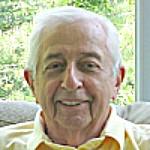 Jack Donovan Jack Donovan
was born and raised in Brooklyn, NY. He has been a student, teacher and educational administrator on three continents and the CEO of two not-for-profits. He writes more than he gets published, but has written one book as has been published in The New York Times, New York Newsday, Spiritual Life, Human Development, The Kentucky English Bulletin et.al. He and his wife Elizabeth came to live at Southport in 2009.
Andy Jablon 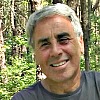
owns a television production company in Watertown that provides crews to shoot stories in New England for the major TV networks. As producer, he interviews all sorts of interesting people on a regular basis. His wife Tracy Tebbutt works at a cancer pharmaceutical company in Cambridge. Since July 2014, they split their time between Southport and Boston, depending on work schedules. Both are enthusiastic cyclists, riding along the Charles River to work in almost all kinds of weather. At Southport, they walk bike, play tennis and soak in the hot tub.
 David Kapp David Kappwith his wife Billie, moved from Connecticut to Southport in 2009. David retired from a career as a university library administrator, after working in the libraries at Brandeis, Harvard and the University of Connecticut. He was a building consultant for the planning of a number of major university libraries and was, for many years the editor of Connecticut Libraries. Billie enjoyed a career as an educator and social sciences consultant. The Kapps are frequent visitors to Hawaii where their son and other family members live. Their daughter and grandson live in Mashpee.
 Jonathan Leavitt Jonathan Leavitt
grew up in Scarsdale, NY. He earned his undergraduate degree in electrical engineering at Rensselaer Polytechnic Institute and a master's degree in the same field from the University of Pennsylvania. He worked at Sprague Electric, Epsco, Di/An Controls, MIT Instrumentation/Draper Labs, and GTE, mostly as a development engineer. The highlight of his career was logic design contribution to an experiment that was carried to the moon on Apollo 17. Married for 42 years to the late Arlene (Samiof), he has three married children and six grandchildren. He has been associated with Southport part-time since 2003, full time since 2008. In 2015, he helped establish the Southport History Club and has been an active participant ever since.
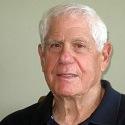 Bob Mendes Bob Mendes
began his career as an advertising copywriter at Doyle Dane Bernbach in NYC before becoming senior vice president of marketing for a west coast department store chain. He left that position to start Pacific Sports, a sports and general marketing agency. There he developed "The Reading Team," a children's literacy program sponsored by the NFL and the American Library Association, using NFL players as literacy role models. Bob is the author of "A Twentieth Century Odyssey, the Bob Mathias Story." After retiring, he served as executive director of the Glendora, CA Chamber of Commerce. When grandson Adam was born, Bob and Bette moved to Cape Cod. He's had a number of part-time jobs, has written two more books, and volunteers. Bette serves on the Board of Governors and volunteers at the Falmouth Jewish Congregation. Their son Steve, a pediatrician, lives in Marion with his wife Sarah and their children; a second son, Jeff, practices law in Indianapolis.
Ray Schumack 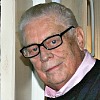
has held positions as a magazine editor, publicity director and an account executive for a Madison Avenue advertising and public relations agency. He served for 15 years as chief communications officer for a Fortune 500 company, responsible for all corporate communications and product promotion literature. His business articles have appeared in The Wall Street Journal, The New York Times, Fortune magazine and elsewhere. He established his own public relations firm and continues to serve several clients in retirement. His memoir, News Releases from the Korean War, recounts his experiences as a war correspondent.
Special Thanks To
my proofreader Billie Kapp
|
|
|
|
|
|
|
|